Women's World Cup 2023: Three legendary players turned managers at this year's tournament
- Published
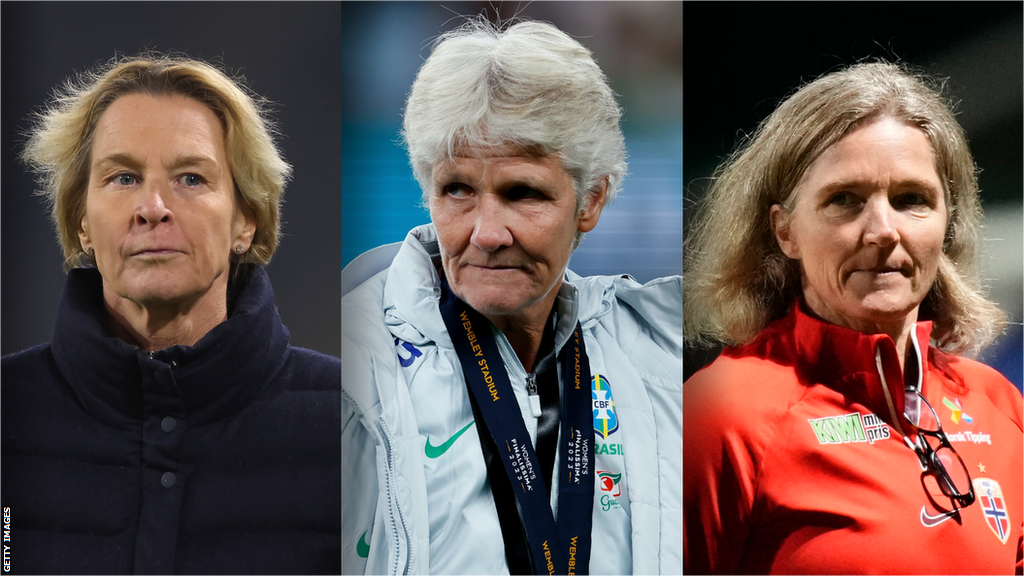
German Martina Voss-Tecklenburg, Swede Pia Sundhage and Norwegian Hege Riise will lead countries at this summer's World Cup
Thirty-two years ago, Martina Voss-Tecklenburg, Pia Sundhage and Hege Riise were breaking new ground as they walked out onto the pitch as star players for their powerhouse European nations at the inaugural Women's World Cup.
At this summer's tournament, they will have prominent roles again, this time as head coaches of Germany, Brazil and Norway respectively.
BBC Sport spoke to all three about those early World Cup steps and the landscape they face today.
Endorsement from Pele
Current Germany boss and former flair forward Voss-Tecklenburg looks back on the first edition of the competition in 1991 as a "tough tournament" for the then European champions.
"To be honest we weren't really so well prepared for it," she says. "It felt like we were playing every other day and we were quite knackered post-game."
Even so, as an office clerk who had taken unpaid leave to play in that World Cup, she went on to experience many memorable moments out in China.
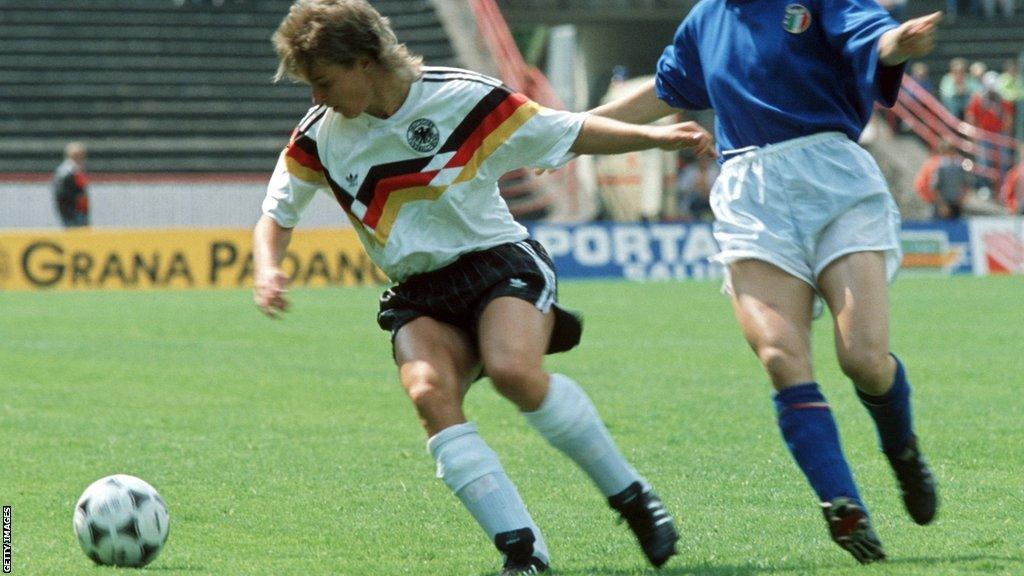
Martina Voss-Tecklenburg had helped Germany become European champions two years before appearing at the inaugural Women's World Cup
Now aged 55, she looks back on training sessions under the gaze of 6,000 Chinese spectators that were "something else".
She also fondly recalls a "merry" breaking of traditional German bread, salami and beer with quarter-final rivals Denmark in the corridor of their shared hotel.
"One of the nicest [moments] is that Pele came to watch a few games," she adds. "And when he had done that he said to his friends 'that German number seven is going to be a great player'."
A speedy dribbler with a never-say-die attitude, she knew Germany's historic journey had not gone unnoticed back home either, after her then partner's brush with the law before a televised match.
"He was caught on a radar trap by the German police and said 'sorry but I had to rush because I want to see that match' and they waved him on without making a big fuss."
Although they were trounced 4-0 in the battle for bronze by Sweden, Germany finished a respectable fourth in 1991 and were runners-up four years later, Voss-Tecklenburg virtually ever-present throughout.
Now she is heading to a second World Cup as Germany head coach and says it would take "an hour" to explore what has changed since those early days.
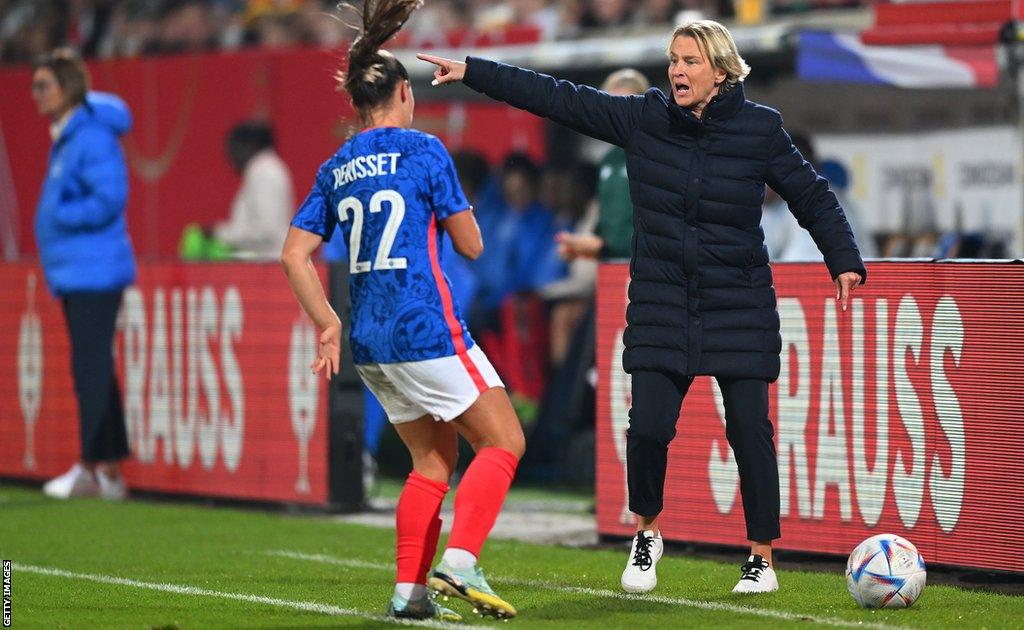
Martina Voss-Tecklenburg, who has been Germany coach since 2019, saw her side lose in the quarter-finals of the 2019 World Cup
"The top thing is we are now supremely prepared, elite professional footballers," she says. "Big data comes into it, pre-match preparations, post-match analysis.
"We had a group of 30-31 people [in 1991]. That has completely changed, with 23 active players and some 70 to 80 persons now, would you believe, working in varied functions, doing their jobs to enable the team to be successful.
"And the degree of attention you get now is incredible, I've read somewhere that the World Cup will be watched by a collective audience of two billion people and those are unthinkable dimensions for me."
Sundhage's singsongs
Sweden's captain Pia Sundhage endured an uncomfortable journey to reach the World Cup in 1991 - quite literally.
Cigarettes were allowed on planes back then and the non-smoking Swede had been seated right by the smoking area. "It was awful," she laughs.
After 16 years as an international, though, she knew the discomfort was worth it.
"We had been fighting for the European Championship in 1984 and that was some sort of statement," she explains. "But we wanted to know who is the best team in the world and when it happened it was huge."
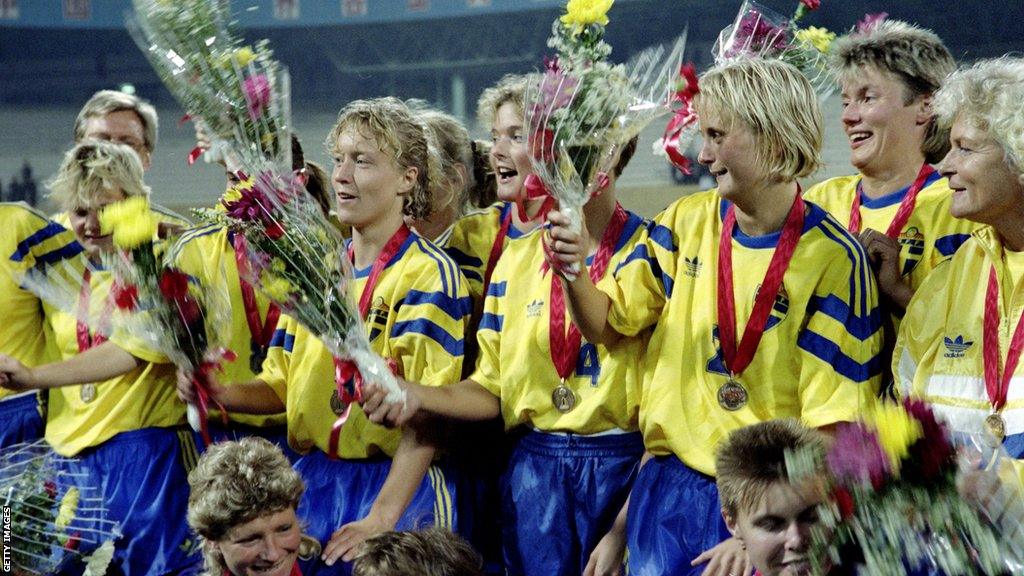
Pia Sundhage was part of a Sweden side who finished third at the inaugural World Cup
Then a 31-year-old cap centurion, Sundhage was part of a Sweden set-up that boasted the only female coach in the tournament, Gunilla Paijkull, and one doctor.
"Back then we hardly saw ourselves on video," she says. "Now you have video from four different angles, GPS, data, it's very different."
Yet as they forged new rivalries and formed unlikely friendships on their way to a bronze medal finish, those historic two weeks in 1991 left an indelible impression.
China proved memorable foes, turning their third-ever meeting with Sweden into a "battle" backed by 55,000 noisy fans and a barrage of snapping cameras.
"We were smart, organised and lucky," says Sundhage, who recalls not just the "dead silence" that met her winning goal, but China's technical prowess too.
She adds: "I'm still fascinated by Asian teams, they hardly have a dominant foot."
The words of Swedish FA official Lars-Ake Lagrell, delivered in a hallway before their match for third place with Germany, continue to resonate with Sundhage too.
"He said, 'Just so you know, it's a big difference to be third or fourth because if you get third you get a medal.' That's something I still keep in my mind."
There were other memorable moments. Like the bond forged with the USA over shared pasta rations and Sundhage's singing tribute after the Americans had won the final.
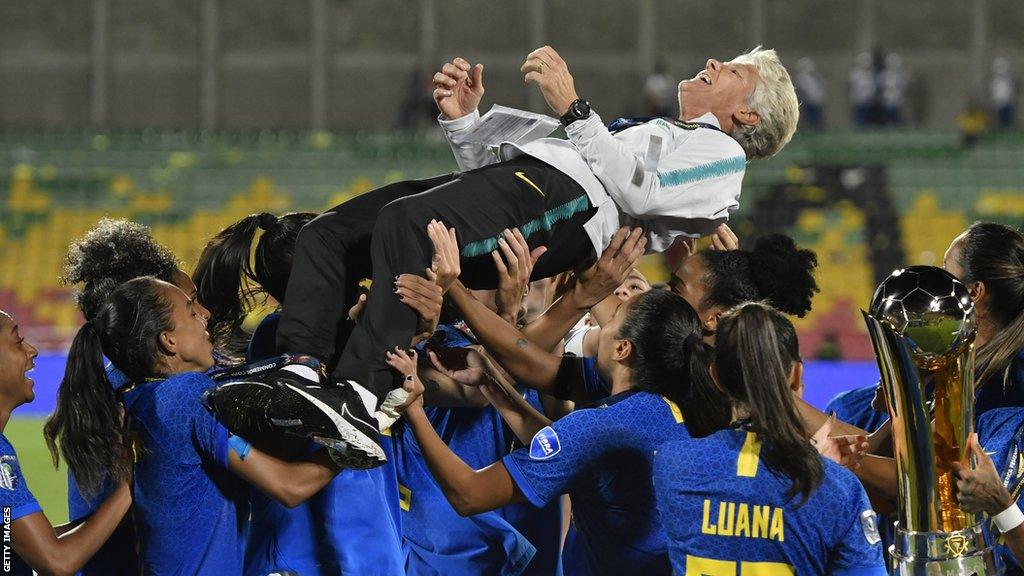
Pia Sundhage has been head coach of three different countries - the United States, her native Sweden and now Brazil
Two decades later, the Swede was serenading the media and USA players, this time on the way to claiming World Cup silver as America's head coach.
Now, having also managed Sweden on this stage, the 63-year-old leads Brazil, hoping she can blend Swedish organisation and Brazilian "great technique" into a winning combination. But will we all be treated to a song?
"If it goes well, yes," she quips. "In Portuguese."
A limousine and a police escort
Hege Riise was a 22-year-old sports shop saleswoman earning her 16th cap on the night Norway kicked off the 1991 tournament against China in Guangzhou.
"I remember driving in on the bus, lots of people standing, waving, excited for the game," Riise says. "And coming to the stadium with 65,000 there, playing an opening game against the home nation - that was a big, big goosebump moment."
Reigning European silver medallists, Norway had prepared for China with matches against male teams and training camps in the USA, Switzerland and Denmark.
Their backroom staff included a doctor, physiotherapist and an administrator, while Riise recalls having a chef in tow, as well as a supply of traditional "brown cheese".
The cheese remains a national team staple in every camp to this day, but as head coach of her country, 53-year-old Riise faces a different landscape now.
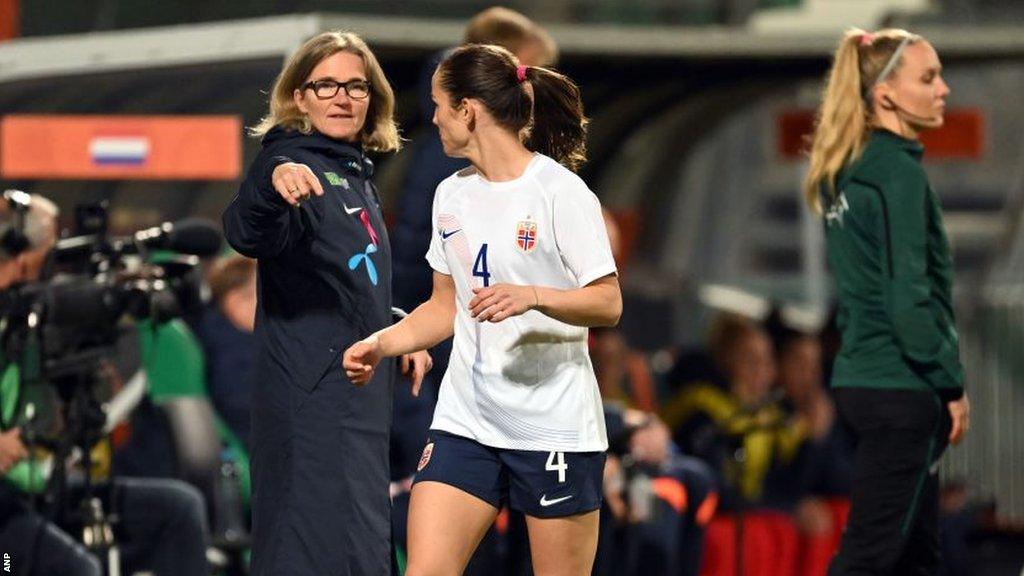
Former England interim and Team GB manager Hege Riise was appointed Norway head coach last August
"There's the limited time before a big tournament with the players and everything on social media that can affect the players," she says. "And the speed of the game, the level of the games, are higher."
Norway failed to reach their level in that opener against China, suffering a thumping 4-0 defeat that Riise calls a "hard start" to their 1991 campaign.
But there were highlights to come and Norway's rookie number nine remembers being "impressed" by the Haka of the New Zealand players before their first-ever encounter, and feeling "starstruck" walking into Brazil legend Pele in her hotel lift.
Most memorable for Riise, though, as she played every minute of the first of her four World Cups, was the 4-1 triumph over Sundhage's Sweden in the semis.
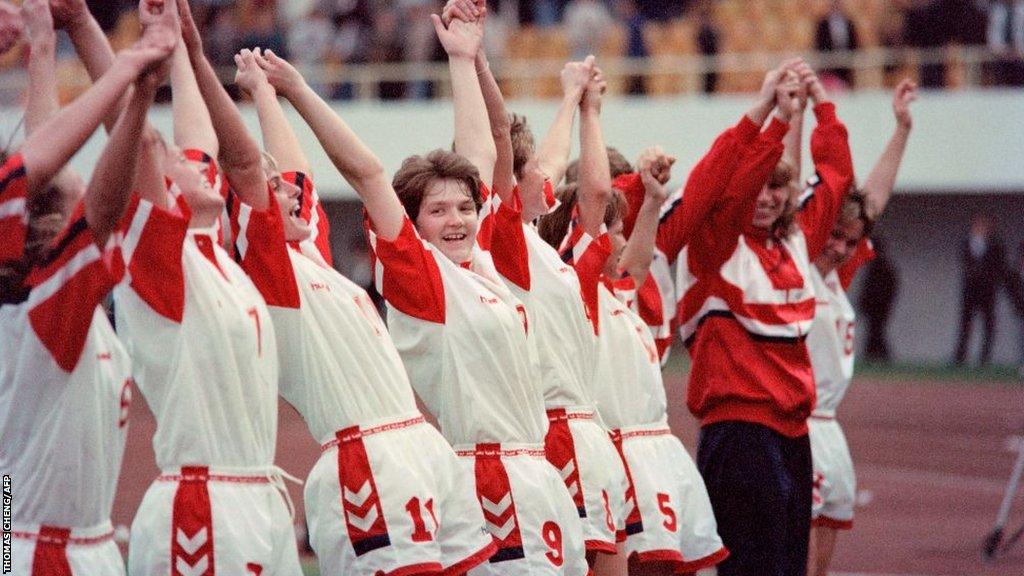
Norway's number nine Hege Riise (centre) celebrated with her team-mates after their 4-1 win over Sweden in 1991
"We felt like we crushed Sweden to be able to play the final," she says.
A late solo effort from tournament top scorer Michelle Akers denied Norway in the showpiece against the USA.
On Swedish soil four years later, it was Riise who set the final alight with a jinking run and killer goal against Germany as Norway steamrollered their way to glory.
Promised a unique ride home from the airport by a club-mate if she won gold, Riise also set curtains twitching as she pulled up outside her small town apartment.
"She had a limousine [arranged] for me with a driver - and a police escort," she laughs. "That was a great moment to remember."